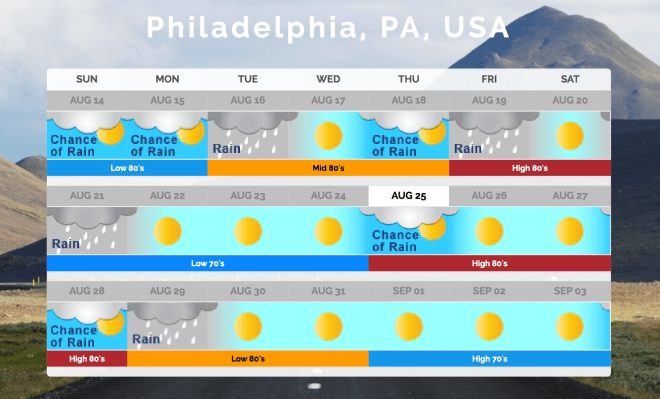Are you sick of not knowing what the weather will be like at your cousin’s best friend’s sister’s birthday party that is in six months? Well, now you can know exactly what the weather will be like that day…sort of.
Recently featured in the TechCrunch Radio Pitch-Off, WeatherPlanner is a year-ahead weather service that will tell you what the weather will be like on any specific day for the next year.
Here’s how it works: The service analyzes 100 years of weather history to make a general prediction about the estimated weather conditions for any date requested, plus 10 days before and after that date. The idea is that users can try to plan a major event in the future without worrying about it being rained out. The company said that this technology is already being used for logistical planning by companies like McDonald’s and Walmart, and they have packaged this same data in a consumer-friendly interface.
While the prospect of never getting stuck in a snow storm certainly sounds appealing, common sense tells us that mother nature has always been, and will continue to be extremely unpredictable.
So just how accurate is WeatherPlanner? Jay Ciccarone, the company’s CEO, explained that the company uses algorithms to track trends with the same probability as a short-term forecast.
“Our algorithms provide an outlook of how weather is trending up to a year in advance with the same probability as a short-term forecast. But that’s where the comparison stops. The science behind each is different and we solve a different problem. You and I plan further out than 10 days for vacations, weddings, sporting events and holiday travel. Like the Fortune 500 companies using this technology, we need WeatherPlanner to better prepare for our special and everyday moments.” – Jay Ciccarone, President and CEO, WeatherPlanner
While the service is available for free, the company is focused on a B2B strategy that sells the service and data to other companies. For example, a department store could use WeatherPlanner’s data to see what dates couples are searching for in the future, and use this data to predict when that couple is getting married, and prompt them to open a gift registry.
Yesterday’s announcement that IBM is paying more than $2 billion to acquire The Weather Company showed just how big of an opportunity weather data is. If accurate, year-ahead weather could eventually wind up being a large part of the data forecasting and analysis associated with weather forecasts.
